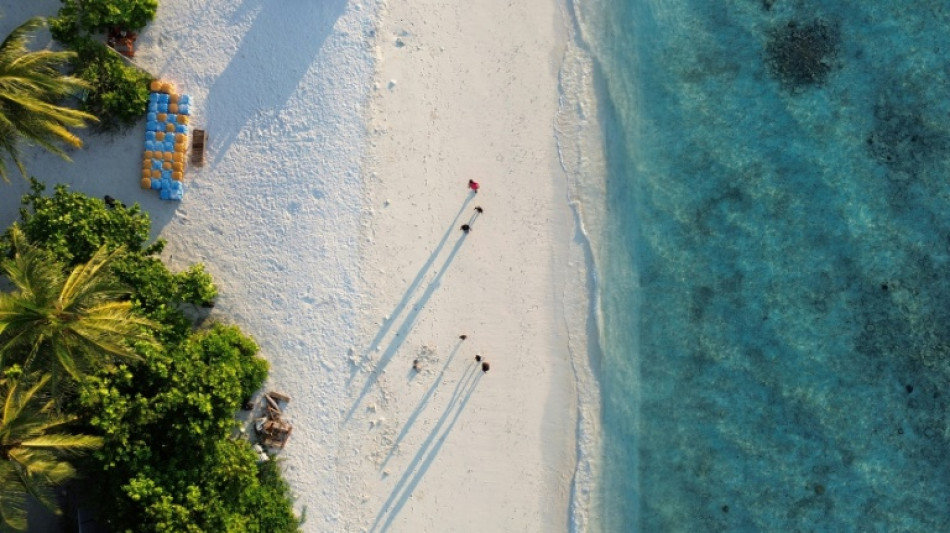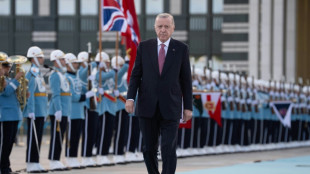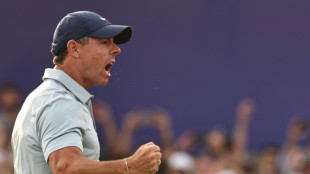
-
 Leftist, far-right candidates go through to Chilean presidential run-off
Leftist, far-right candidates go through to Chilean presidential run-off
-
Zelensky in Paris to seek air defence help for Ukraine

-
 Bangladesh verdict due in ex-PM's crimes against humanity trial
Bangladesh verdict due in ex-PM's crimes against humanity trial
-
A pragmatic communist and a far-right leader: Chile's presidential finalists

-
 England ready for World Cup after perfect campaign
England ready for World Cup after perfect campaign
-
Cervical cancer vaccine push has saved 1.4 million lives: Gavi

-
 World champion Liu wins Skate America women's crown
World champion Liu wins Skate America women's crown
-
Leftist leads Chile presidential poll, faces run-off against far right

-
 Haaland's Norway thump sorry Italy to reach first World Cup since 1998
Haaland's Norway thump sorry Italy to reach first World Cup since 1998
-
Portugal, Norway book spots at 2026 World Cup

-
 Sinner hails 'amazing' ATP Finals triumph over Alcaraz
Sinner hails 'amazing' ATP Finals triumph over Alcaraz
-
UK govt defends plan to limit refugee status

-
 Haaland's Norway thump Italy to qualify for first World Cup since 1998
Haaland's Norway thump Italy to qualify for first World Cup since 1998
-
Sweden's Grant captures LPGA Annika title

-
 Tuchel lays down law to Bellingham after England star's frustration
Tuchel lays down law to Bellingham after England star's frustration
-
Sinner caps eventful year with ATP Finals triumph over great rival Alcaraz

-
 Portugal book spot at 2026 World Cup as England stay perfect
Portugal book spot at 2026 World Cup as England stay perfect
-
Hakimi, Osimhen, Salah shortlisted for top African award

-
 Sinner beats great rival Alcaraz to retain ATP Finals title
Sinner beats great rival Alcaraz to retain ATP Finals title
-
Schenk wins windy Bermuda Championship for first PGA title

-
 Crime, immigration dominate as Chile votes for president
Crime, immigration dominate as Chile votes for president
-
Kane double gives England record-setting finish on road to World Cup

-
 World champions South Africa add Mbonambi, Mchunu to squad
World champions South Africa add Mbonambi, Mchunu to squad
-
Greenpeace says French uranium being sent to Russia

-
 'Now You See Me' sequel steals N. American box office win
'Now You See Me' sequel steals N. American box office win
-
Argentina beat Scotland after frenzied fightback

-
 Argentina beat Scotland after stunning fightback
Argentina beat Scotland after stunning fightback
-
Pope urges leaders not to leave poor behind

-
 Pressure will boost Germany in 'knockout' Slovakia clash, says Nagelsmann
Pressure will boost Germany in 'knockout' Slovakia clash, says Nagelsmann
-
Ecuador votes on hosting foreign bases as Noboa eyes more powers

-
 Portugal qualify for 2026 World Cup by thrashing Armenia
Portugal qualify for 2026 World Cup by thrashing Armenia
-
Greece to supply winter gas to war battered Ukraine

-
 India and Pakistan blind women show spirit of cricket with handshakes
India and Pakistan blind women show spirit of cricket with handshakes
-
Ukraine signs deal with Greece for winter deliveries of US gas

-
 George glad England backed-up haka response with New Zealand win
George glad England backed-up haka response with New Zealand win
-
McIlroy loses playoff but clinches seventh Race to Dubai title

-
 Ecuador votes on reforms as Noboa eyes anti-crime ramp-up
Ecuador votes on reforms as Noboa eyes anti-crime ramp-up
-
Chileans vote in elections dominated by crime, immigration

-
 Turkey seeks to host next COP as co-presidency plans falter
Turkey seeks to host next COP as co-presidency plans falter
-
Bezzecchi claims Valencia MotoGP victory in season-ender

-
 Wasim leads as Pakistan dismiss Sri Lanka for 211 in third ODI
Wasim leads as Pakistan dismiss Sri Lanka for 211 in third ODI
-
Serbia avoiding 'confiscation' of Russian shares in oil firm NIS

-
 Coach Gambhir questions 'technique and temperament' of Indian batters
Coach Gambhir questions 'technique and temperament' of Indian batters
-
Braathen wins Levi slalom for first Brazilian World Cup victory

-
 Rory McIlroy wins seventh Race to Dubai title
Rory McIlroy wins seventh Race to Dubai title
-
Samsung plans $310 bn investment to power AI expansion

-
 Harmer stars as South Africa stun India in low-scoring Test
Harmer stars as South Africa stun India in low-scoring Test
-
Mitchell ton steers New Zealand to seven-run win in first Windies ODI

-
 Harmer stars as South Africa bowl out India for 93 to win Test
Harmer stars as South Africa bowl out India for 93 to win Test
-
China authorities approve arrest of ex-abbot of Shaolin Temple


Maldives to battle rising seas by building fortress islands
Rising sea levels threaten to swamp the Maldives and the Indian Ocean archipelago is already out of drinking water, but the new president says he has scrapped plans to relocate citizens.
Instead, President Mohamed Muizzu promises the low-lying nation will beat back the waves through ambitious land reclamation and building islands higher -- policies, however, that environmental and rights groups warn could even exacerbate flooding risks.
The upmarket holiday destination is famed for its white sand beaches, turquoise lagoons and vast coral reefs, but the chain of 1,192 tiny islands is on the frontlines of the climate crisis and battling for survival.
Former president Mohamed Nasheed began his administration 15 years ago warning citizens they might become the world's first environmental refugees needing relocation to another country.
He wanted the Maldives to start saving to buy land in neighbouring India, Sri Lanka or even far away in Australia.
But Muizzu, 45, while asking for $500 million in foreign funding to protect vulnerable coasts, said his citizens will not be leaving their homeland.
"If we need to increase the area for living or other economic activity, we can do that," Muizzu told AFP, speaking from the crowded capital Male, which is ringed with concrete sea walls.
"We are self-sufficient to look after ourselves".
- 'Out of fresh water' -
The tiny nation of Tuvalu this month inked a deal to give citizens the right to live in Australia when their Pacific homeland is lost beneath the seas.
But Muizzu said the Maldives would not follow that route.
"I can categorically say that we definitely don't need to buy land or even lease land from any country," Muizzu said.
Sea walls will ensure risk areas can be "categorised as a safe island", he said.
But 80 percent of the Maldives is less than a metre (three feet) above sea level.
And while fortress-like walls ringing tightly-packed settlements can keep the waves at bay, the fate of the beach islands the tourists come for are uncertain.
Tourism accounts for almost one-third of the economy, according to the World Bank.
Nasheed's predecessor, Maumoon Abdul Gayoom, was the first to ring the alarm of the possible "death of a nation", warning the United Nations in 1985 of the threat posed by rising sea levels linked to climate change.
The UN's Intergovernmental Panel on Climate Change (IPCC) warned in 2007 that rises of 18 to 59 centimetres (7.2 to 23.2 inches) would make the Maldives virtually uninhabitable by the end of the century.
The warning lights are already flashing red.
Gayoom's fear of his country running out of drinking water has already come true, as rising salt levels seep into land, corrupting potable water.
"Every island in the Maldives has run out of fresh water," said Shauna Aminath, 38, the environment minister until last week, when Muizzu's government took power.
Almost all of the 187 inhabited islets in the archipelago depend on expensive desalination plants, she told AFP.
"Finding ways as to how we protect our islands has been a huge part of how we are trying to adapt to these changes", Aminath said.
- Environmental regulations 'ignored' -
The capital Male, where a third of the country's 380,000 citizens are squeezed onto a tiny island, is "one of the most densely populated pieces of land in the world" with 65,700 people per square kilometre, according to the environment ministry.
A giant sea wall already surrounds the city, but Muizzu said there is potential to expand elsewhere.
Reclamation projects have already increased the country's landmass by about 10 percent in the past four decades, using sand pumped onto submerged coral platforms, totalling 30 square kilometres (11 square miles).
Muizzu, a British-educated civil engineer and former construction minister for seven years, played a key part in that, overseeing the expansion of the artificial island of Hulhumale.
Linked to the capital by a Chinese-built 1.4-kilometre (0.8-mile) bridge, with tower blocks rising high over the blue seas, Hulhumale is double the area of Male, home to about 100,000 people.
But environmental and rights groups warn that, while reclamation is needed, it must be done with care.
In a recent report, Human Rights Watch (HRW) accused the authorities of failing to implement their own environmental regulations, saying reclamation projects were "often rushed" and lacked proper mitigation policies.
It gave the example of an airport on Kulhudhuffushi, where 70 percent of the island's mangroves were "buried", and a reclamation project at Addu which damaged the coral reefs fisherman depended on.
"The Maldives government has ignored or undermined environmental protection laws, increasing flooding risks and other harm to island communities," HRW said.
Ahmed Fizal, who heads the environmental campaign group Marine Journal Maldives (MJM), said he feared politicians and businessmen saw shallow lagoons as potential reclamation sites to turn a quick profit.
"You have to ask 'what is the limit, what is the actual cost of reclamation?'", he said.
A.AbuSaada--SF-PST




